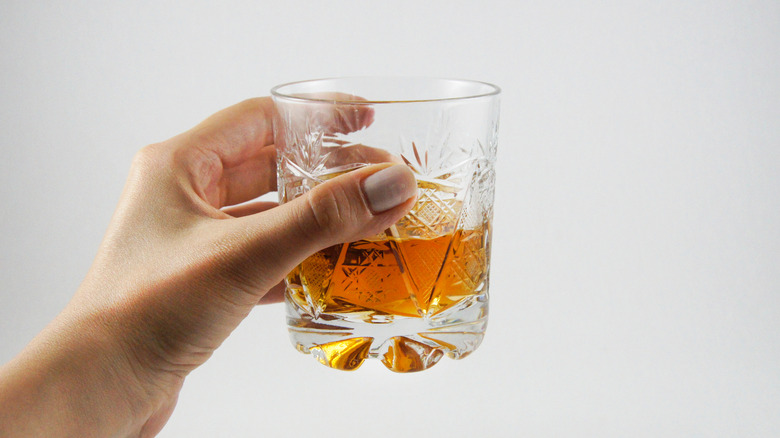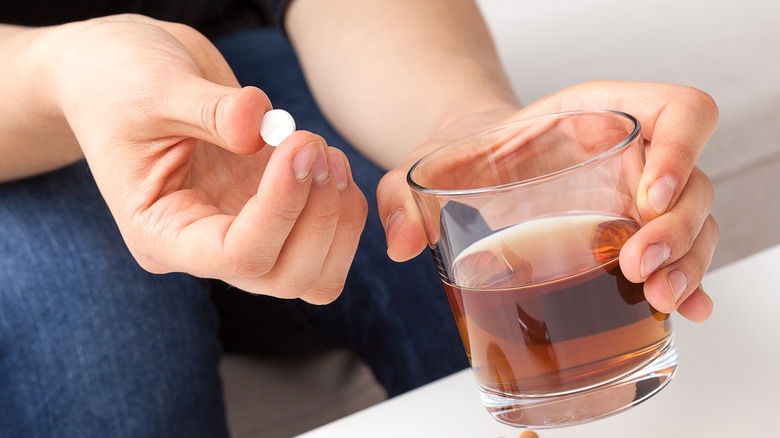When You Drink Whiskey Every Night, This Is What Happens To Your Body
Let's talk about whiskey. There are countless popular country songs written about it, and the popularity of this drink is only continuing to grow both in the media and in sales. According to a report done by Global Market Insights, Inc., the whiskey market will exceed $84 billion worldwide by the year 2025. "There's a growing appreciation for [bourbon] among millennials as opposed to beer and some other stuff," Michter's Distillery president Joseph Magliocco told CNBC.
In 2018, the oldest living woman in Great Britain, Grace Jones (aka "Amazing Grace"), attributed her long life to the glass of whiskey she drank each night. "I started having a nightly tot of it when I turned 50 so I've been having it every night for the last 60 years, and I certainly have no intention of stopping now," she told Gloucestershire Live.
So, is there something to drinking whiskey every night? Here's what happens to your body when you drink whiskey often.
Your genes determine how whiskey affects you
Everyone is completely different when it comes to what flavors and types of alcohol they prefer, and whiskey is definitely one that appeals to a certain set of taste buds. However, a person's genetic makeup has a major impact on how whiskey affects their body as well.
For one, whiskey is usually thought of as more of a "man's drink." Fortunately, Jim Beam has been at the forefront of changing this perception, as actress Mila Kunis has endorsed the company's whiskey in their commercials. Interestingly enough, women are thought to be better at taste-testing whiskey than men are, according to science. It's apparently due to their more heightened sense of smell, as noted by Forbes.
It should go without saying that people who require medication and drink whiskey, or any other type of alcohol for that matter, can be at a substantial risk to the drink's more negative effects. This also applies to pregnant women, current or recovering alcoholics, and those with liver disease (via Harvard University).
If you drink whiskey every night instead of other alcohol, you'll consume less calories and carbs
For those alcohol enthusiasts who aren't looking to gain a beer belly, whiskey is a great choice. It contains no carbohydrates and virtually no sugar, as noted by Medical Daily. It also contains the least amount of calories compared to beer and most wines, according to Medline Plus.
Some studies have even suggested that drinking whiskey can help a person to lose weight. According to Harvard University, "moderate drinking might be especially beneficial if you have low HDL that just won't budge upward with diet and exercise." HDL is the good type of cholesterol, and it helps to remove "excess cholesterol" in a person's bloodstream to keep a person's body in better shape (via Mayo Clinic).
However, keep in mind that adding any type of mixer to the whiskey can drive up your calorie count. "If you're looking for a lower calorie alternative, avoid the flavored vodkas and spiced rums and go for the original or 'plain' option offered," Caroline Cederquist, M.D., told GQ. So, when you order a Jack and Coke — maybe hold the Coke!
Drinking whiskey could help alleviate a cold
When a person is feeling just a bit under the weather, whiskey won't do 'em wrong. After all, even during the Prohibition in the 1920s when alcohol was banned throughout the U.S., doctors would prescribe whiskey to patients for medicinal purposes. "There may have been some people who were being prescribed because there was a perceived medical need, but it was really a way for some physicians and pharmacists to make a few extra bucks," Daniel Okrent, author of "Last Call: The Rise and Fall of Prohibition," told SmithsonianMag.com.
However, as modern medicine and science has improved over time, studies today have shown that there really is some medical benefit to drinking just one glass of whiskey on a sick day (via HuffPost). Even though there is no known cure for the common cold, whiskey has properties that can help alleviate its symptoms and help make a person feel much better. "The alcohol dilates blood vessels a little bit, and that makes it easier for your mucus membranes to deal with infection," Dr. William Schaffner of the Vanderbilt University Medical Center told ABC News.
You might help improve your immune system
Turns out, it may be a good idea to have hot toddies on more of a regular basis. If people drink whiskey every night, they may not even have gotten sick in the first place, according to a study done by Oregon Health & Science University. Their experiment showed that drinking alcohol in moderation (one or less drinks per day for women and two or less for men, according to Harvard University) can help amp up the immune system and even help fight infections.
The key to keeping healthy is drinking in moderation. Drinking alcohol in excess, the study found, didn't provide the same results. "If you have a family history of alcohol abuse, or are at risk, or have been an abuser in the past, we are not recommending you go out and drink to improve your immune system," Ilhem Messaoudi, the study's author, said. "But for the average person who has, say, a glass of wine with dinner, it does seem in general to improve health and cardiovascular function. And now we can add the immune system to that list."
If you drink whiskey every night, you could keep away bacteria
Alcohol has been, both historically and even today, used and thought of as an antiseptic. Because of this, it's really no wonder many characters in action movies have been shown pouring whiskey onto their wounds in emergency situations (though there are much better ways to clean a wound!). According to one study, the properties in whiskey help to remove bacteria that people are unconsciously putting into their bodies — even germs that can live on the ice we drink!
To prove this, the study placed ice cubes that were contaminated with four different types of bacteria in various beverages. They included vodka, peach tea, Coke, whiskey, a Martini, and tonic water. When they later cultured out the bacteria in the various drinks, whiskey was the only one that did not allow any type of bacteria to grow in it (via the American Council on Science and Health). It's all the more reason to drink whiskey every night — in moderation, of course!
Studies show that you may be able to help your heart health
Grace Jones, who was once the oldest woman in Great Britain, told Gloucestershire Live, "My doctor said 'keep up with the whisky Grace, it's good for your heart.'" Turns out, her doctor was onto something.
WebMD reviewed 84 studies showing that people who enjoyed a daily drink — or less — were 14 to 25 percent less likely to be diagnosed with heart disease than those who didn't drink. This could be due to alcohol raising the body's levels of HDL cholesterol. Whiskey drinkers also reportedly absorb more antioxidants than red wine drinkers, which can help protect against coronary heart disease (via BBC News).
However, because whiskey affects different people in different ways, Harvard University found that for a 30-year-old, the risks outweigh the benefits. For a 60-year-old, one drink per day may have more heart disease protection than potential harm. So be sure to take that into consideration when deciding if you should drink whiskey every night.
Drinking whiskey every night could affect your memory
If you drink whiskey every day, we'd imagine having a glass would be especially satisfying at the end of a long work shift. However, a whiskey drink may "make people nauseous" or "give people hangovers," as assistant professor of neuroscience at Brown University, Karla Kaun, noted to Forbes. She further asked, "So why do we find them so rewarding?" She added, "Why do we remember the good things about them and not the bad?"
Sure, drinking enough whiskey can cause a lapse in memory (and sometimes even judgment), but her study found that drinking whiskey can also affect how memories are formed. The team at Brown University concluded that whiskey completely alters proteins in the brain that are responsible for forming memories. Kaun noted she was afraid this could cause people to become dependent on alcohol in general, as it completely changes the way a person's brain is wired when drinking. With excessive drinking, this can lead to serious mind-changing problems. "After three glasses, with an hour break in between, the pathway doesn't return to normal after 24 hours," she said.
Another study found that men who had 2.5 daily drinks had signs of memory loss sooner than light to moderate drinkers. Cheers to the memories?
It may lower your risk of dementia and Alzheimer's
It seems drinking whiskey can do a person's brain some good in the long-term. A study coming out of Boston concluded that drinking one to six drinks each week might actually lower the risk of developing dementia and Alzheimer's among older adults. This combined with a healthy lifestyle, of course.
"Although there is no surefire way to completely prevent dementia, the best current evidence indicates that as well as only drinking in moderation, staying physically and mentally active, eating a healthy balanced diet, not smoking, and keeping weight, cholesterol and blood pressure in check are all good ways to support a healthy brain as we age," Dr. Sara Imarisio, head of research at Alzheimer's Research U.K., told BBC News.
On the other hand, various studies have shown that drinking too much alcohol like whiskey can cause the complete opposite effect (via BBC News), so we better stick to enjoying a glass only six days a week at most like the study suggests! In our opinion, Mondays should definitely be one of those days.
You may ease stress and anxiety
"I need a drink," is something many people are guilty of saying after a long day at the office or perhaps after an unnecessarily stressful family reunion. Whiskey is a depressant, which means it slows down a person's central nervous system (via VeryWell Mind). This is what makes a smooth glass of whiskey provide soothing relief after a hard day, and let's face it: Today's world is more of an anxiety-ridden society than ever before, so it's important to be smart about ways to deal with stress.
According to a study published in Alcoholism: Clinical and Experimental Research in 2006, 20 percent of those with social anxiety disorder have also created a negative form of dependence on alcohol. The Center for Disease Control and Prevention says heavy drinking includes eight or more drinks per week for women and 15 or more drinks per week for men. So, if you drink whiskey every night, you may feel calmer, but be sure not to overdo it.
You can dry out your skin if you drink every night
Though drinking a daily glass of whiskey may help ease a person's stress, unfortunately, it can stress out their skin. After all, there are many ways drinking alcohol affects your looks. "While all alcohol can have damaging effects on your skin, dark liquors contain congeners, which are impurities," makeup artist Molly Leahy told StyleCaster. She added, "The more congeners you consume, the worse your skin will look the next day."
The ingredients found in whiskey deprive a person's body of water (via AcnEase), causing the skin to become dry and potentially age more quickly over time. "Hard liquor can also cause skin redness by dilating blood vessels, causing spider veins and broken capillaries, particularly around nose and cheeks area," Dr. Dimitry Rabkin, the founder of Esthetica MD, said.
However, even with all of that being the case, a person can still enjoy one glass of whiskey as long as they take precautions with their skin in mind. Having spoken to Dr. Isabel Sharkur, a naturopathic doctor, PopSugar advised people to moisturize the morning after drinking to prevent skin from drying out.
Enjoying whiskey every night could prolong your life
Drink up, because it turns out that drinking alcohol like whiskey has been proven to actually prolong a person's life — giving them even more time to enjoy whiskey.
A team at the University of California researched what makes certain people live to and beyond age 90. Their study found that the people who enjoyed two glasses of alcohol every evening had a slimmer chance of dying sooner. "I have no explanation for it, but I do firmly believe that modest drinking improves longevity," neurology specialist Claudia Kawas told Independent.
Studies continue to prove this. Another study done at the University of Texas found that drinking alcohol can actually help a person to live a longer life. However, moderation is the key. They found that heavy drinking actually increased a person's risk of death by 45 percent. Even more shocking, people who didn't drink any alcohol over the course of the study had an increased risk of 51 percent.
You could damage your liver
It's important to not over-drink when trying to reap the benefits that whiskey can bring. Drinking more than one glass daily provides none of the benefits that this drink of choice has been proven to provide. In fact, it could seriously harm your body.
One of the largest organs that can easily be ruined by whiskey is the liver. We have all been warned of this, but how much is too much exactly? Well, by drinking three or four glasses a day, a person has a much higher chance of developing chronic liver disease, as reported by Vice. It may not seem like much and a person may feel completely fine after drinking the stuff for years, but the damage builds up over time and is sure to catch up with any devout whiskey lover. "It's very sad, because when people do get sick from this, they're generally in their mid-30s to mid-40s," said medical director Steven Flamm from Northwestern Memorial Hospital in Chicago.
A drink a day may seem like it will keep the doctor away, but whiskey is best limited to just that.
You may lower your chances of having a stroke
While you enjoy your nightly glass of whiskey, you may also be decreasing your risk of developing a stroke. Researchers have shown that a person's risk may drop somewhere between 25 to 40 percent if they drink alcohol. Harvard University assessed over 100 scientific studies to come to this conclusion.
However, don't get too excited about downing some whiskey this evening just yet. All studies stressed that a stroke could only be potentially prevented by "light to moderate drinking." According to Harvard, that means only enjoying an ounce and a half each day to reap this benefit. Otherwise, the opposite may take effect. One study published in 2015 found that drinking more than two glasses of alcohol every night can increase your chances of developing a stroke, at least in people 60 years or older — and even cause it to happen earlier on in your life.
Drinking whiskey every night could potentially help regulate your insulin
For those of us hoping to cut sugar completely out of our diets, whiskey may be the way to go. Because it contains no sugar at all — unless you add any sort of mixer to it — it may be one of the best alcohols for those with type 2 diabetes. One study published in Nutrition, Metabolism and Cardiovascular Diseases in 2010 even found that drinking a moderate amount of alcohol won't raise a person's blood sugar. Researchers noted, "Long-term alcohol use seems to be associated with improved glycemic control in [type 2 diabetes] probably due to improved insulin sensitivity."
Crazy enough, the study also concluded that whiskey may decrease the chances of developing type 2 diabetes. On the other hand, binge-drinking increased a person's chances of being diagnosed.
While this may be the case, it's still best for those who struggle with their blood sugar and insulin to take care in what they're putting into their bodies — especially when it comes to alcohol. For diabetics especially, "the most important thing is to make sure you aren't drinking alcohol on an empty stomach," Boston-based nutrition manager Liz Brouillard recommended to Everyday Health.
Your sleep cycle can be interrupted if you drink often
Sure, whiskey may make it easier to fall asleep, but it could be what's responsible for keeping you up all night long too — and we don't just mean because you're busy enjoying it at a party.
Though all alcohols are depressants, which can help relax the body before bed, this eventually wears off during your REM phase of sleep. Getting an adequate amount of REM sleep is responsible for helping boost your memory and concentration, so if you're constantly waking up, you could be seriously sabotaging your focus for the next day.
Depending on how much you drink, you'll likely be waking up more often to use the bathroom too. Whiskey is classified as a diuretic, which means that it makes your body rid itself of water more quickly. This alone could also be keeping you away from the sleep you desperately need.
Luckily, a single glass each evening shouldn't affect your slumber too much (via the National Sleep Foundation). However, to avoid tossing and turning completely, the Sleep Health Foundation recommends not drinking any alcohol whatsoever for at least four hours before falling asleep each night.
Drinking whiskey can interfere with your medications
There are plenty of benefits that you can gain from enjoying a glass of whiskey each night, but if you're taking any kinds of medications, you could be canceling out both of their benefits and setting yourself up for some serious problems.
Taking a pill for something as simple as heartburn could be causing the alcohol in your system to affect you more intensely. Even just popping a pill for a normal headache can give you nasty side effects when combined with whiskey (via Verywell Mind). Unfortunately, it's a pretty common problem, too. One study published in PLoS ONE in 2018 found that many adults often combine their medications — whether they're prescribed to them or not — with alcohol. Surprisingly, many don't even seem a problem with mixing the two. "It is important therefore that health professionals including family doctors, community nurses, and pharmacists consider older patients' alcohol consumption prior to prescribing or dispensing medication," researchers concluded.
You're more likely to suffer from a horrible hangover if you drink whiskey every night
We all know that indulging in too much alcohol each evening can have us waking up with a nasty hangover. Unfortunately, whiskey drinkers have some of the worst hangovers compared to those who enjoy other kinds of alcohol.
The high alcohol content in whiskey is one reason for this. Another big reason is that whiskey contains more congeners compared to other alcohols. A study published in 2008 in Alcohol and Alcoholism studied this effect, and researchers found that drinks with more congeners led to even more horrible hangovers. And given that drinking alcohol can also dehydrate the body, it's no wonder whiskey can leave us all feeling yucky the day after.
"The simplest of ways to beat the hangover goes to the heart of what makes whisky so sought after: less is more," Stephen Marshall, an ambassador for the whiskey Dewar's, recommended to CNN. "Don't drink too much because after a point you're not going to enjoy it and when you wake up the morning." Moderation is always key when it comes to enjoying whiskey.
Your daily whiskey could lower your risk of death from atherosclerosis
Moderate alcohol consumption may increase HDL cholesterol, according to a study published in 2000 in the journal, Circulation. We've already discussed how that can support better heart and brain health. It may also reduce your risk of death from atherosclerosis, which the National Heart, Lung, and Blood Institute says is ultimately responsible for more deaths in the U.S. than any other cause.
HDL cholesterol is called "good cholesterol" because it helps remove LDL cholesterol, the deservedly named "bad cholesterol" — i.e., the one known to deposit plaque along the inside walls of the arteries. That plaque buildup, known clinically as atherosclerosis, has the effect of narrowing the arteries. And narrowing of the arteries can damage one's health in numerous ways, including raising blood pressure or contributing to blood clots, thereby increasing stroke risk. Narrowing of the arteries also interferes with optimal blood flow, which diminishes the amount of oxygen available throughout the body, including the vital organs. That's why atherosclerosis is associated with various forms of organ damage, including kidney disease.
So, where does whiskey come into play? Well, an older study published in Experimental and Molecular Pathology went so far as to show that whiskey consumption had an anti-atherosclerotic effect in rabbits. In 2014, this was shown to be the case for humans as well (via Mayo Clinic Proceedings). However, the review noted, "The risk-benefit ratio of habitual moderate alcohol intake appears to be more favorable for middle-aged and older people compared with younger individuals."
Whiskey may provide some pain relief
Did you know that in the short term, a bit of whiskey could help alleviate pain?
All the way back in in 1941, scientists confirmed that whiskey is an effective painkiller, per Time. Or, as one of the researchers, Cornell University's Dr. Harold George Wolff, said at the time, "Whiskey is one of the cheapest and best painkillers known to man." He continued, saying, "It is cheaper than morphine. ... Of course alcohol is habit-forming but an alcohol habit is less difficult to deal with than a morphine habit."
The fact that alcohol can temporarily quell pain has long been recognized and understood. In 2016, alcohol's analgesic effects were confirmed once again, this time in a study published in the Journal of Pain. All of that being said, it's worth noting whiskey is most effective as a painkiller when imbibed in quantities exceeding public health recommendations. As such, you'd be better off not using whiskey to ease your pain.
Can whiskey really aid in digestion?
Some have claimed that a post-dinner whiskey can quell digestive discomfort. As much as we might like that to be true, science suggests cynicism is warranted when it comes to treating whiskey as a "digestif," according to an academic paper published in the journal, Gut. As VinePair explains, a digestif is an alcoholic beverage served after a meal for the purpose of aiding in digestion. Traditionally, digestifs tend to be higher proof alcohols. And therein lies the rub.
As the authors of the academic paper pointed out, alcoholic beverages with a lower volume of alcohol — e.g., beer and wine — do, in fact, effectively stimulate gastric secretions that may aid in digestion. However, whiskey and other beverages with a higher alcohol content do not. In fact, it appears that anything with a higher proof than beer may offer diminishing digestive returns. Moreover, a later study, which was also published in Gut, found that only fermented alcoholic beverages offer digestive benefits. Thus, whiskey and other distilled beverages do not.
Still more damning is what German physician Carsten Lekutat told Deutsche Welle in 2015, which is that it's not even the alcohol in alcoholic beverages that aid digestion, but rather other substances. "Alcohol actually impedes gastric emptying," Dr. Leuktat concluded.
Whiskey may have an anti-inflammatory effect
You may have heard that whiskey is one of the "healthiest" kinds of alcohol. While it's certainly not a magical health tonic, it is true that whiskey has anti-inflammatory benefits. This is because whiskey contains the antioxidant, ellagic acid, according to WebMD. And ellagic acid is associated with reduced inflammation throughout the body.
A 2013 study of mice published in the Journal of Ethnopharmacology as well as a 2021 study of mice published in the International Journal of Molecular Sciences each showed that ellagic acid can be an effective alternative treatment for some chronic inflammatory conditions. To get the maximal anti-inflammatory benefits from whiskey, the late whiskey scholar Dr. Jim Swan once said that a single malt is best because single malt whiskeys have more ellagic acid than blended, and even more than red wine, which has long been renowned for its anti-inflammatory properties (via Chemistry World).
Whiskey's antioxidants have been praised for being cancer-fighting
Chronic inflammation is associated with oxidative stress, according to an academic paper published in Gut Microbes, and oxidative stress is responsible for DNA damage, not to mention the development of cancerous tumors.
Since whiskey has anti-inflammatory properties owing to its ellagic acid content, it stands to reason that to the extent that the ellagic acid in whiskey reduces inflammation, it also reduces oxidative stress, which, in turn, decreases the risk of tumor growth and other consequences of DNA damage. Indeed, that's the point the late Dr. Jim Swan seems to have been making when he told the 2005 EuroMedLab conference in Glasgow, Scotland: "Whisky can protect you from cancer and science proves it" (via Telegraph).
Meds News concurs, explaining that ellagic acid fights free radicals and can stop them from regrowing. Nevertheless, other health experts, including Dr. Lesley Walker of Cancer Research UK, advise against thinking of whiskey as a cancer preventative. "Ellagic acid is a powerful antioxidant, but that does not mean it is necessary to hit the bottle," Dr. Walker told Prepared Foods. "There is an abundance of this acid in soft fruits" — a much safer source of ellagic acid. Additionally, the American Cancer Society cites alcohol consumption as a risk factor for the development of cancer, attributing 6% of cancers and 4% of cancer-related deaths to preventable alcohol consumption.
Moderation is key
Drinking whiskey in moderation can lead to benefits, but what exactly does "moderation" mean? According to Harvard University, this is one drink daily for women and no more than two for men. However, one drink does not mean filling a glass to the brim with some smooth Tennessee whiskey (although, sometimes that seems like a great idea). Rather, one glass is 1.5 ounces.
Over time, though, one glass of whiskey each evening can make a person feel differently than before. Building up a tolerance to alcohol can be dangerous because it can cause over-drinking, and, over time, the liver learns how to more easily and quickly break down the alcohol in a person's system.
The brain has a similar reaction. It will literally alter itself and adjust to handling alcohol so well that a person will no longer have any of those loopy effects people may have felt when they had their first drink. And, when it comes to drinking too much, your brain will never be the same. "The system is forever changed," director of the National Institute on Alcohol Abuse and Alcoholism, George F. Koob, Ph.D., told HuffPost.
Worried about your alcohol tolerance? Here are some signs you drink too much.
If you or anyone you know needs help with addiction issues, help is available. Visit the Substance Abuse and Mental Health Services Administration website or contact SAMHSA's National Helpline at 1-800-662-HELP (4357).
























